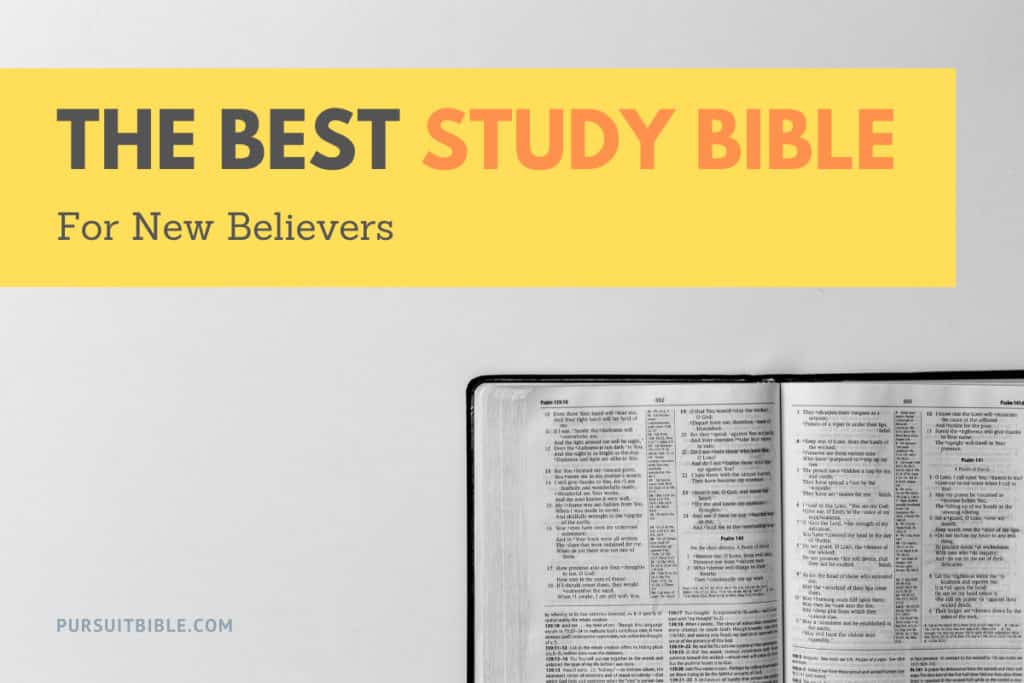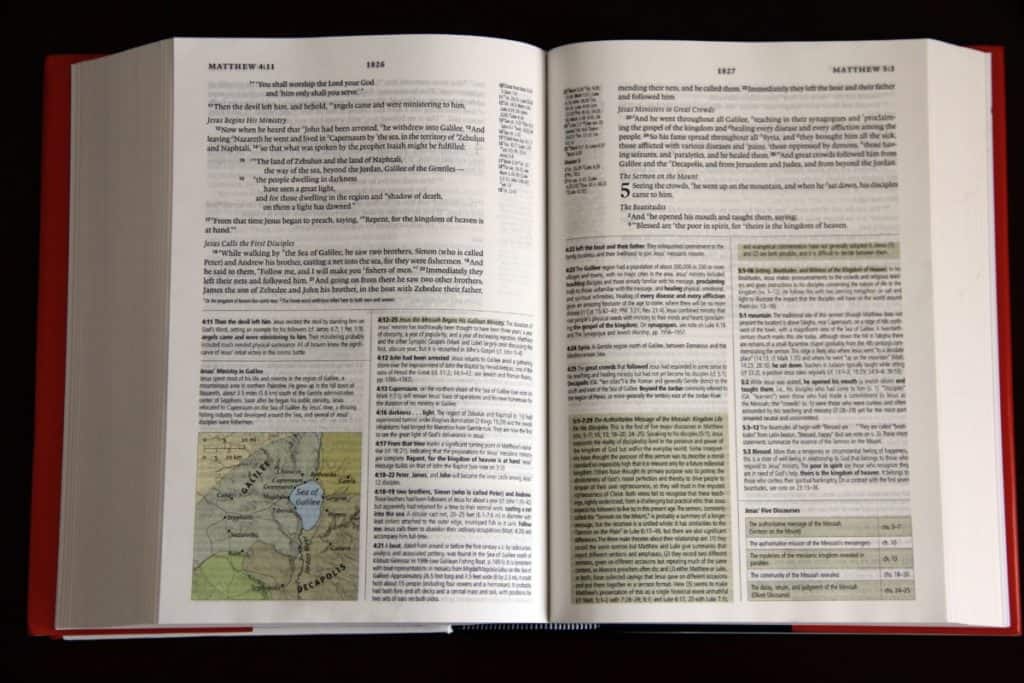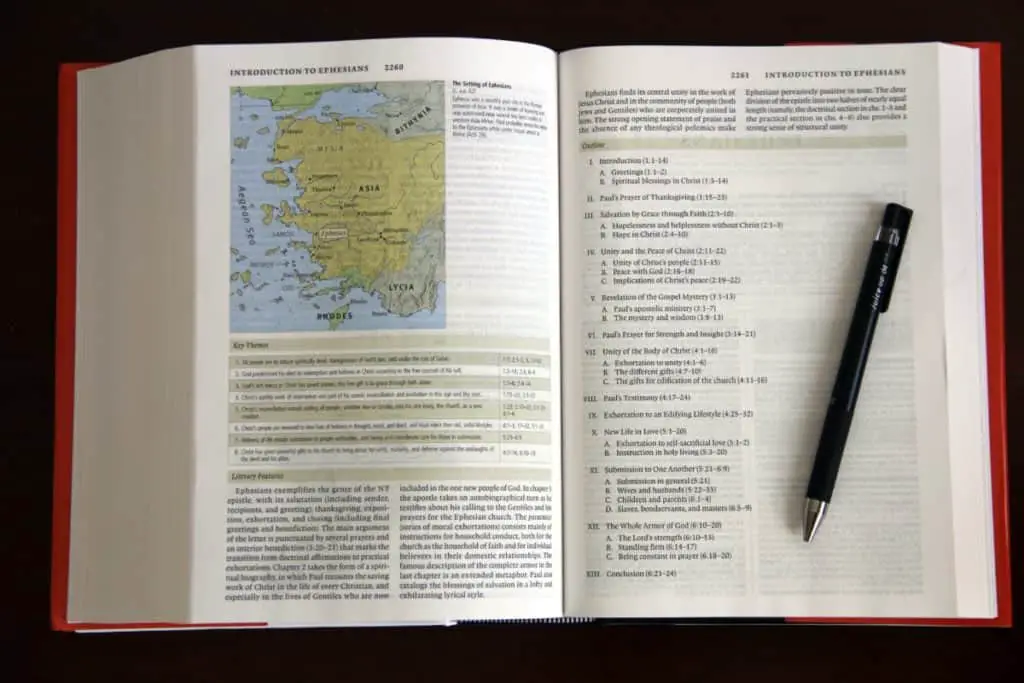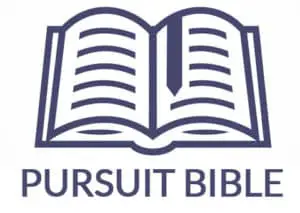
Study Bibles are a great resource to go deeper in studying God’s Word. I got my first study Bible more than 30 years ago, but I still remember the day like it was yesterday. It’s really exciting to be able to start studying the Bible for yourself.
Whether you’re looking for one for yourself or for someone who’s just starting out, this is a big step in spiritual growth. There are a lot of options to choose from. What is the best study Bible for beginners or anyone who wants to begin going deeper in studying the Bible?
I’ll give a few recommendations below, but here’s my top recommendation for most people:
[UPDATE for 2023: I’ve updated my recommendation to the CSB Tony Evans Study Bible (you can take a look at the reviews on Amazon). It’s a good balance of solid scholarship with application to everyday life. It’s a great fit for new believers that want to go deeper in their understanding of the Bible.
I still recommend the ESV Study Bible for some people, but it leans toward the academic side, so I’ve updated my recommendation.]
The best study Bible for most new believers is the ESV Study Bible.
- It’s thorough enough for an in-depth study.
- It’s broadly accepted.
- It’s easy to use
One thing to keep in mind is that the CSB is a good and dependable translation but the ESV is much more popular.]
The ESV Study Bible (link to Amazon – opens in a new window) doesn’t have as many color photos and fancy designs as some of the other Study Bibles out there.
It’s more along the lines of being simple, elegant, and straightforward in its design elements. I take this as a positive because you can keep your attention on the Bible and its message and not be distracted by the design features.
A good study Bible for those starting out should be clear and easy to use. Study Bibles have a lot of resources in one-volume, so it’s important that it be clearly laid out.
I wrote an article where I explain how to use several of the Study Bible’s main features. I use the ESV Study Bible in my examples, so you can get an idea of what it looks like: How to Use a Study Bible: A Helpful Illustrated Guide (link opens in a new window.
The ESV Study Bible has the text of the entire Bible and over 20,000 study notes on specific verses. It has a solid collection of useful Bible tools all in one-volume: Book introductions, outlines, charts, diagrams, photos, and a concordance.
The ESV Study Bible is not a light-weight by any means. It’s a big book and not something people will be carrying around for a quick study session during their lunch break at work.
It’s more of the resource people will probably keep at home. Some people might consider taking it on a rare occasion to the coffee shop, but it is a big reference book and quite hefty. But, it’ll be a great investment for many years to come.
There are a lot of study Bibles out there. Each one has a different emphasis and fills a different need. Although the ESV Study Bible is the best recommendation for most people, your situation might vary slightly, so I’ll explain why I recommend it, and in case your situation is different, what other options you might want to consider.
Table of Contents
- A Study Bible for Beginners Should Be Thorough
- Study Bibles for Beginners Should Be Capable Enough for Serious Study
- A Study Bible for Beginners Should Be Easy to Use
- Other Options for Study Bibles for Beginners
- Things to Consider When Choosing a Study Bible for Beginners
- Encounter God Through His Word
A Study Bible for Beginners Should Be Thorough

A study Bible for beginners should be thorough and substantial enough for a deeper study of the Bible. The main reason for getting a study Bible is so that you can go deeper into God’s Word. Hearing sermons and being in a Bible study group are important, but studying the Bible for yourself is a vital part of growing spiritually.
A study Bible is an all-in-one-volume resource of the most used tools to understand the Bible better. It’s often the first “serious” book that people buy when they want to study the Bible for themselves.
Most study Bibles have a similar line-up of tools and resources. There are pretty standard options like notes and commentary, cross-references, concordance, book introductions, etc… Study Bibles come in all the major English translations of the Bible like the ESV, NIV, NKJV, KJV, and the NLT.
The biggest difference among Study Bibles is how many notes there are and the amount of detail they get into.
Each Study Bible has different contributors that write the notes, which are usually at the bottom of each page, often in a smaller sized font than the actual text of the Bible. Some Bible will have minimal notes while others have notes for many if not most verses in the Bible.
For example, 95 different Bible scholars and teachers contributed toward the ESV Study Bible. Most Study Bibles have many contributors, which makes for good variety, and also broader acceptance from different theological perspectives.
As you read a passage of Scripture, you can look down at the comments to see what the contributors commented on the verse. It’s helpful in the beginning stages of studying the Bible to have the guidance from these notes. You just have to keep in mind that these notes are people’s research and study of the Bible, not the Bible, the text of God’s Word.
It’s not a good experience to be struggling with understanding a verse to find that there are no helpful comments on it. Having a study bible that is through will be helpful and less frustrating.
Study Bibles are not meant to be comprehensive Bible commentaries, but they should “scratch the itch” for the most common questions that beginning Bible students will have.
The ESV Study Bible is one of the most thorough Study Bibles available now. It has a lot of notes and helps that the beginner will need to get started in understanding the Bible better. It’ll take a bit of a learning curve to learn to use all it has to offer, but it’ll be worth it in the long-run.
Study Bibles for Beginners Should Be Capable Enough for Serious Study
There are some Study Bibles for a narrower audience, for example, like ones geared specifically for Women, Men, or with a specific focus, such as leadership, etc… There are Bibles with colors and designs catered toward a specific group or age group.
These are usually what I would call devotional or application type “study” Bibles. I put “study” in quotes because they’re main aim is not so much for deeper study, but for general Bible engagement for specific groups. These types of Bibles usually have limited comments and notes on individual verses compared to the more general Study Bibles.
For example, you won’t find many notes on individual verses. Some have little or no commentary at all. With these types of Bibles, you’ll usually find a few articles catered toward the specific group of readers.
A Study Bible like the ESV Study Bible and the others I’ll mention below are geared toward a more general audience that wants to study God’s Word and not a specific group of people. They’re also for a bit more in-depth study of the Bible.
A good example of an application or devotional type of Study Bible is The NIV Women’s Study Bible (link to Amazon – opens in a new window), which has over 300 articles on topics geared toward women. These have great articles that apply the Scripture specific to Women and also includes character studies of women in the Bible.
The NIV Women’s Study Bible doesn’t have as many notes on individual verses when compared to the ESV Study Bible. This makes space in it for Bible study resources with spiritual mentoring for women. It’s a good combination of both and my best recommendation for a Women’s Study Bible.
Both are good Study Bibles. It all depends on what you’re looking for and what your goals are in studying the Bible.
If you’re interested in studying the Bible on a more narrow topic, like a Study Bible geared toward women, men, or a smaller group, one option is to go for the more solid Study Bible like the ESV Study Bible. Then you can look for good books on the topic that you’re looking for.
Instead of getting Bible with some articles on the topic, find a good book on the topic instead. It will have similar content as these types of Study Bibles, but in a different format. Instead of 300 articles scattered through-out the study Bible, it’ll be in a regular book format with chapters.
On a side note, I do want to mention that I don’t use a Study Bible nearly as much as I used to. There are more detailed and specific resources such as entire commentaries on just one book of the Bible. But when I do reach for one, the first is usually the ESV Study Bible.
But a Study Bible, as a one-volume reference with all the most common tools, is a great resource, especially for those just starting out. I definitely wore out my first Study Bible after using it for more than 10 years!
A Study Bible for Beginners Should Be Easy to Use
A Study Bible can be a bit overwhelming as it is. Many of the popular ones are over 2000 pages long! There’s a bit of a learning curve to using one and from my experience, many people just end up looking at the notes or commentaries on the individual verses.
The ESV Study Bible has a clear and easy-to-use layout and is great for beginners. The layout feels very intuitive and things are not overly colorful as to distract from the Bible itself.

If you’re looking for something with more splashes of color, you might want to consider the NIV Study Bible (link to Amazon – opens in a new window). It has a more contemporary layout with more colorful photos and design elements. It’s a solid Study Bible and very similar to the ESV Study Bible in many ways. It has a bit less “scholarly” feel than the ESV Study Bible.
The NIV Study Bible isn’t as widely accepted as the ESV Study Bible these days. There is some controversy around the direction of translation with the latest NIV edition, particularly with its use of gender-neutral language.
I would recommend the NIV Study Bible for someone who has some awareness of the controversy and not for someone who is just starting out studying the Bible for themselves. Generally for new believers, I would recommend the ESV Study Bible because it’s more broadly accepted by more churches and denominations today.
Other Options for Study Bibles for Beginners
The Study Bibles mentioned above have many contributors who wrote notes and articles for them. There are some that are written by one specific Bible-scholar or teacher.
Jonn MacArthur’s Study Bible is especially good for help in understanding the original historical context of the Bible.
These types of Study Bibles would, of course, reflect the theological perspectives of one person. If you’re a fan of the author, these are good alternatives.
Some Bibles have more of a specific theological perspective. The New Spirit-Filled Life Bible is probably the best choice from a Charismatic/Pentecostal perspective. Jack Hayford, the main editor, wrote most of the study notes, and it also includes articles and other helps from many other contributors. It’s a solid Study Bible, but also covers topics that the more general ones don’t get into.
Both Study Bibles are excellent, but are from different theological perspectives and cater to different people and needs. I personally have used both and can recommend them both for different people.
Lastly, one alternate recommendation to the ESV Study Bible is the Life Application Study Bible.
It’s a little lighter on the notes and study resources compared to the ESV Study Bible, but is still a solid Study Bible. Its focus is more toward applying the Bible to your life. That is a great focus to have because it’s easy to get lost in the details and not have God’s Word to transform your life.
It comes in several different translation options, but the NLT is a good translation for beginners because it’s easy to read but still accurate. Here’s an article I wrote about the NLT where I explain a little bit about different Bible translations: What Version of the Bible is Easiest to Read? (Link opens in a new window).
Things to Consider When Choosing a Study Bible for Beginners
1. Get a hardcopy and not an eBook for your first Study Bible.
I love the portability of an eBook, but for those just starting out, I would very strongly recommend getting a print edition.
The reason is that you can’t see all the great resources a Study Bible has unless you click several times in an eBook. It’s also not as convenient to click back and forth between resources.
For example, if you’re starting to use a study Bible, you might not know how useful the cross-references are, and wouldn’t know where to click in an eBook to use it. If you stick to a print edition, you’ll be able to see all the relevant resources on the page right near the text of the Bible you’re looking at.
Note: Some Study Bibles, like certain editions of the ESV Study Bible, usually the more expensive editions, offer an online- version of the same content if you buy the print edition. This is not true for all editions, so make sure to confirm if this is an option that’s important to you. If one isn’t included, you can consider buying the eBook edition separately.
2. Look at the different options for font sizes
Read the reviews or look at photos to make sure the font size will be comfortable for you. Some of the smaller editions, sometimes called Personal or compact sizes, have very small print, especially for the notes. The smaller and thinner Study Bibles are better for carrying around, but they’re smaller because they use thinner paper or smaller font sizes along with thinner margins.
If you’re mainly going to use the Study Bible in one-place, I’d recommend getting a regular, full-size Study Bible and not a personal edition. Some Study Bibles also have large print editions available, which are bigger than the regular ones.
If you’re planning on carrying it to different places to study, and don’t mind the smaller font sizes, a Personal Size edition would be a good fit for you.
3. Consider options with covers & built-in tabs
A Study Bible is a resource you can use for many years. If you don’t mind spending a little more money, get a cover that will last. The prices vary, sometimes by quite a lot from paperback, hard-cover, imitation leather, to full-grain leather. You’ll get a lot of mileage out of your Study Bible, so invest in the best cover you can afford.
Also, if an option is available that includes built-in tabs for the books of the Bible, I’d recommend getting it. It’ll pay off in the time that is saved while looking up the different verses in the Bible. And they look much better than the stick d.i.y. tabs that stick out and end up ripping when they get caught on something.
If you want to look into more details before you choose a Study Bible, I wrote a more detailed article here: How to Choose a Study Bible,
Encounter God Through His Word
I hope this article has given you confidence in choosing a study Bible. It’s a great investment towards your spiritual growth. Whether you go with the ESV Study Bible or any of the other great options, “take the plunge” and go deep into God’s Word!
Blessed is the man
Psalm 1:1-2 (ESV)
who walks not in the counsel of the wicked,
nor stands in the way of sinners,
nor sits in the seat of scoffers;
but his delight is in the law of the Lord,
and on his law he meditates day and night.
Subscribe to my newsletter for updates and encouraging content.
| If you want to learn more about using a Study Bible, I wrote an article on How to Use a Study Bible: A Helpful Illustrated Guide where I explain how to use the main features. Seeing one “in action” might help you make a better decision of which Study Bible would be the best choice for you. |






Thank you for your information on study bibles.
The information was very useful.
Thank you. I’m glad to hear it was helpful.
I travel a lot & am unable to attend bible study groups. I am thrilled to have found (been led to) your recommendations for a beginner such as myself, to get a study bible. Thank you for your guidance.
I’m so glad it was helpful. That’s great that you still have a heart to study the Bible with your traveling. I’m sure you’ll discover lots of insights and encouragement along the way. God bless you as you press into His heart through His Word!